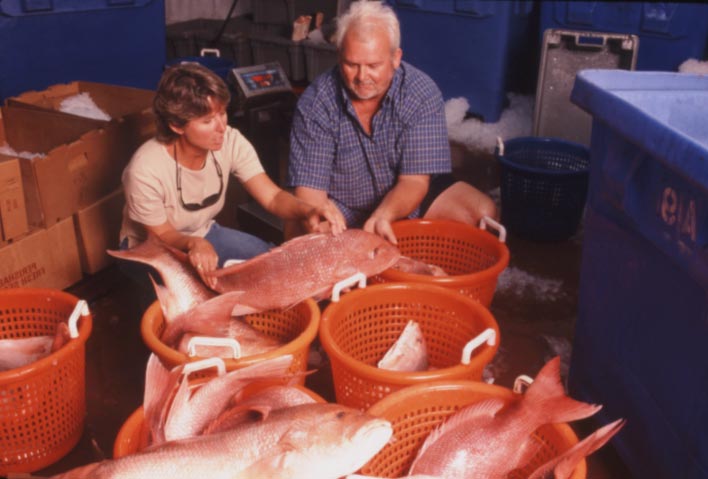
No matter how many scientific studies emerge confirming the benefits of catch shares, you always have opponents who say catch shares may work in “theory,” but still have doubts about their real-life application.
However, it’s hard to refute on-the-ground, tangible results, like those shown down in the Gulf of Mexico.
This week the National Marine Fisheries Service (NMFS) released the 2008 annual report reviewing the progress of its Gulf of Mexico commercial red snapper individual fishing quota program (IFQ), which is a type of catch share.
The report shows continued success for red snapper two years into the program, and provides additional support for implementing IFQs to rebuild other troubled fisheries.
The report’s conservation highlights include:
- Overfishing is being reversed in the commercial fishery.
- Fishermen have caught under less than allotment by 2.5-4.0 percent in the past two years.
- Fishermen cut their ratio of wasted fish to fish taken to the docks by almost 70 percent. (Before the IFQ, for every fish a fisherman kept, he threw one back dead. Now, fishermen only throw one back for every three to four that they keep.)
The report’s economic highlights include:
- Long season closures and extreme market swings have been eliminated.
- With year-round fishing, fishermen bring high quality fish to the dock when consumer demand is high, helping their businesses remain profitable.
- The price fishermen pay for quota, the long-term privilege to catch red snapper, rose by 37 percent, reflecting optimism for a healthy fishery and a commitment to conservation.
With the conservation gains seen in the commercial red snapper fishery in just a few years, we are optimistic that rebuilding is getting underway and the payoff might be a rising catch limit in the near future. The Gulf of Mexico Fishery Management Council is on the right track by considering IFQs and other catch share plans for many of its other commercial and sport fisheries that are in dire need of better management.
The NMFS report concludes that the commercial red snapper fishery is on the right track, and it identifies a few ways that it can be improved. For example, the mislabeling of fish needs to be stopped, and better ways are needed to count dead fish that some vessels continue to throw overboard, especially off of the Florida peninsula coast.










 the water and at the docks.
the water and at the docks. January marked the second anniversary of the Gulf’s red snapper IFQ program. Fortunately, fishermen, regulators and environmentalists continue to report good news compared to the decade the fishery suffered under destructive derby management (also known as a “race” for the limited number of snapper that fishermen were allowed to catch each year).
January marked the second anniversary of the Gulf’s red snapper IFQ program. Fortunately, fishermen, regulators and environmentalists continue to report good news compared to the decade the fishery suffered under destructive derby management (also known as a “race” for the limited number of snapper that fishermen were allowed to catch each year). The West Coast is a big step closer to improving management of its valuable and struggling groundfish fishery. A plan for individual fishing quotas (IFQs) was identified as a top priority for the groundfish commercial trawl fishery by fishermen and the regional fishery management council. A goal for implementation in 2011 has been set.
The West Coast is a big step closer to improving management of its valuable and struggling groundfish fishery. A plan for individual fishing quotas (IFQs) was identified as a top priority for the groundfish commercial trawl fishery by fishermen and the regional fishery management council. A goal for implementation in 2011 has been set.